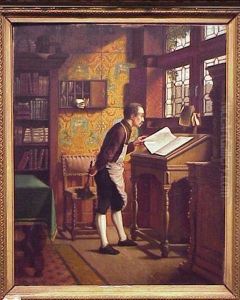Eduard Jacobs Paintings
Eduard Jacobs was a Dutch cabaret artist and singer who is often considered the father of Dutch cabaret. Born on July 18, 1868, in Groningen, the Netherlands, Jacobs grew up in a time when the cabaret tradition as we know it was just beginning to take shape. He is credited with bringing the form of cabaret to the Netherlands after being influenced by the Parisian café-concerts during the late 19th century.
Jacobs began his career as a pianist, but he eventually found his calling as a cabaret performer after moving to Paris. There, he was exposed to the thriving cultural scene and the burgeoning form of entertainment that combined music, satire, and social commentary in a small, intimate setting. Inspired by what he saw, Jacobs returned to the Netherlands and began performing as a cabaret artist in Amsterdam at the end of the 19th century.
His performances were known for their sharp wit and for addressing social issues of the time, which was relatively new to Dutch audiences. Jacobs had a talent for satire and his songs often dealt with the hypocrisies of bourgeois society, and he gained popularity for his ability to engage with contemporary issues through his performances.
Despite his influence on Dutch culture and the popularity he enjoyed during his lifetime, Eduard Jacobs's career was relatively short and he struggled with financial instability and health issues. He retired from performing in 1913 and passed away a year later, on February 2, 1914, in Amsterdam.
Jacobs's legacy lies in his pioneering role in establishing the cabaret as a form of entertainment in the Netherlands. His approach to performance, which featured a combination of humor, music, and social critique, laid the groundwork for future generations of Dutch cabaret artists. Today, he is remembered as a key figure in the history of Dutch performing arts, and his influence can still be seen in the Dutch cabaret tradition.
